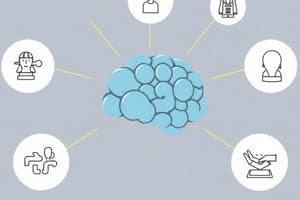Podcast
Questions and Answers
What is motivation?
What is motivation?
A need or desire that energizes and directs behavior toward a goal.
Do you think that our motivation changes as we age?
Do you think that our motivation changes as we age?
True (A)
Besides money, what motivates adults to go to work?
Besides money, what motivates adults to go to work?
What are the factors that consist in motivation?
What are the factors that consist in motivation?
Which of the following is NOT a psychological perspective of motivation?
Which of the following is NOT a psychological perspective of motivation?
What is the Drive-Reduction Theory?
What is the Drive-Reduction Theory?
What examples of behaviors are motivated by drive reduction?
What examples of behaviors are motivated by drive reduction?
____ motivates individuals to maintain an optimum level of arousal.
____ motivates individuals to maintain an optimum level of arousal.
Which instinct corresponds to a tendency to engage in confrontational behavior?
Which instinct corresponds to a tendency to engage in confrontational behavior?
Instincts are learned behaviors.
Instincts are learned behaviors.
Flashcards are hidden until you start studying
Study Notes
Motivation
- A need or desire that energizes and directs behavior toward a goal
Motivation Factors
- Intensity: How hard an individual tries
- Direction: Focus of effort towards achieving targeted behavior
- Persistence: Continuous effort towards a goal
Psychological Perspectives of Motivation
- Evolutionary (Historical) Explanations
- Instinct Theory
- Biological Explanations
- Drive and Drive Reduction Theory
- Arousal Theory
- Cognitive Explanations
- Incentive Theory
- Behavioral Explanation
- Incentive Theory
- Humanistic Explanations
- Hierarchy of Needs
- Psychoanalytic / Psychodynamic Explanation
- Sociocultural Explanation
Theories of Motivation
- Instinct Theory: Motives are innate and based on genetically hard-wired behaviors, called instincts
- Instinct: A complex, inherited and rigidly patterned behavior within a species
- **Drive and Drive Reduction Theory: ** Based on unmet biological needs and restoring a balance.
- Drive: An internal state of tension triggered by an imbalance in the body. This tension motivates an organism to restore balance.
- Arousal Theory: People are motivated to maintain an optimal level of arousal; not too high, not too low
- **Incentive Theory: ** Motivation comes from external or internal stimuli that pull or push behavior
- Humanistic Theory: Based on a hierarchy of needs, with basic needs at the bottom and self-actualization at the top
Evolutionary Theory
- Instinct Theory: Organisms are born with pre-programmed tendencies to respond to certain events in specific ways.
- Instinct: Genetically pre-programmed behaviors that enhance an organism's ability to cope with environmental situations.
- Difficulty using instincts as labels and explanations for all behaviors.
- Examples of Instincts: Rivalry, submission, sympathy, modesty, fear, secretiveness, shyness, repulsion, cleanliness, jealousy, food-seeking, curiosity, sociability, combativeness, parental love, hunting, and mating.
Instinct
- Motivation is based on innate, unlearned behaviors.
Drive-Reduction Theory
- Behavior is motivated by reducing internal tension caused by unmet biological needs.
- A physiological need creates an aroused tension state (drive) that motivates an organism to satisfy the need.
- Examples of drive-reducing behaviors: eating and drinking.
Drive
- Creates imbalances in the body.
- Triggers an organism to restore balance, typically reducing the drive itself.
- Part of the Drive-Reduction Theory.
Studying That Suits You
Use AI to generate personalized quizzes and flashcards to suit your learning preferences.




